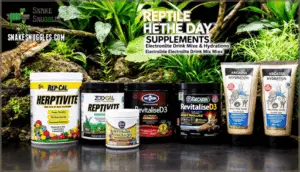This site is supported by our readers. We may earn a commission, at no cost to you, if you purchase through links.

The snake diet electrolyte supplementation guide isn’t about adding random powders to your reptile’s enclosure. It’s about understanding which minerals keep your snake’s muscles firing, bones strong, and organs functioning during both feeding cycles and fasting periods.
Getting electrolyte balance right means fewer vet visits and a healthier reptile that sheds cleanly and moves with confidence.
Table Of Contents
- Key Takeaways
- Snake Diet Nutrition: Essential Electrolytes and Nutrients
- Choosing The Right Supplements for Snakes
- Safe Supplementation and Dosage Guidelines
- Electrolyte Support During Snake Diet Fasting
- Monitoring Snake Health and Preventing Deficiencies
- Frequently Asked Questions (FAQs)
- Can Snake Juice help with electrolyte imbalances during fasting?
- What electrolytes are in Snake Juice?
- What vitamins should I take if I’m a reptile?
- What is a Snake Juice Diet?
- Is the snake diet a healthy diet?
- How does the snake diet work?
- Can snakes absorb electrolytes through soaking water?
- How often should electrolytes be given?
- What causes electrolyte imbalances in captive snakes?
- Are commercial electrolyte products snake-safe always?
- Conclusion
Key Takeaways
- Whole prey naturally delivers the right protein-to-fat ratio (62% protein, 17% fat) and balanced calcium-to-phosphorus ratio (2:1) that most healthy snakes need, making routine supplementation unnecessary unless specific deficiencies appear.
- Calcium only works when paired with vitamin D3 for absorption, and snakes lacking proper UVB exposure or dietary D3 can develop metabolic bone disease even when eating appropriately sized prey.
- During extended fasting periods, snakes experience gradual electrolyte depletion (sodium, potassium, chloride), and offering electrolyte solutions through soaking or drinking water helps maintain cellular function and prevents dehydration-related shedding problems.
- Over-supplementation poses serious toxicity risks, so precise dosing based on veterinary guidance and regular health monitoring (weight checks, body condition scoring, fecal exams) prevents both deficiencies and dangerous overdoses.
Snake Diet Nutrition: Essential Electrolytes and Nutrients
You need to know what your snake actually requires before you start adding supplements to its diet. Most snakes thrive on whole prey alone, but understanding their nutritional baseline helps you spot when something’s off.
Let’s break down the essentials that keep your snake healthy and strong.
Key Nutritional Requirements for Snakes
Snakes don’t do well on guesswork regarding nutrition—they need specific amounts of calcium, phosphorus, vitamin D3, and essential amino acids to stay healthy and strong.
Whole prey like mice and rats deliver this balanced diet naturally, packing about 62% protein and 17% fat along with trace minerals that keep their immune systems firing on all cylinders.
Role of Calcium, Phosphorus, and Vitamin D3
Your snake’s skeleton depends on three nutrients working together like a well-oiled machine. Calcium and phosphorus balance at the ideal 2:1 Ca:P ratio bolsters bone mineralization, while vitamin D3 powers calcium absorption. Without adequate UVB exposure or vitamin D3, your snake can’t use dietary calcium effectively—even if you’re feeding whole prey.
Studies show corn snakes with proper UVB lighting boost their vitamin D3 levels considerably, proving that phosphorus utilization and calcium work hand-in-hand for skeletal strength. A diet with optimal calcium content is essential for reptiles.
Importance of Trace Minerals and Amino Acids
Beyond the big three bone builders, your snake’s body runs on a network of smaller nutrients—trace minerals like zinc, copper, and selenium team up with essential amino acids to keep immunity sharp and metabolism humming. These essential nutrients for snakes work behind the scenes:
- Zinc powers immune support and wound healing
- Copper maintains metabolic function and tissue repair
- Selenium acts as an antioxidant shield
- Amino acids drive muscle development from protein sources
Whole prey delivers this nutritional balance naturally—no extra reptile supplements needed for healthy snakes.
Protein and Fat Ratios in Snake Diets
Your snake needs roughly 62% protein and 17% fat from its food to stay strong and healthy. These ideal protein and essential fats ratios mirror prey composition—mice and rats naturally pack the right nutritional punch for growth impact.
Mess with these ratios and you’ll see health implications down the road. Think of it as nature’s recipe that doesn’t need tweaking with Snake Juice or any electrolyte drink unless your vet spots an electrolyte balance issue.
Choosing The Right Supplements for Snakes
Picking the right supplements for your snake isn’t about guessing or buying everything on the shelf. It’s about matching specific nutrients to your snake’s actual needs without overdoing it.
Let’s look at the key supplement categories and which products actually deliver what they promise.
Calcium and Vitamin D3 Supplement Options
Most people don’t realize that calcium without vitamin D3 is like trying to build a house without a hammer—you’ve got the materials but no way to use them. You need both working together to support bone health and prevent metabolic bone disease.
Look for calcium supplements paired with D3 in powder or liquid forms, and watch your dosage carefully since too much creates toxicity risks that mess with calcium and phosphorus balance.
Reptile-Specific Multivitamins and Minerals
Think of reptile multivitamins as the safety net that catches whatever nutrition whole prey might miss—even when you’re feeding quality rodents. These reptile-specific supplements support nutrient absorption and deficiency prevention while avoiding dangerous supplement interactions.
- Rep-Cal Herptivite delivers balanced vitamin supplements without toxicity risks
- Zoo Med Reptivite provides easy-to-dust mineral deficiencies coverage
- Arcadia RevitaliseD3 combines immune boost vitamins with proper calcium ratios
- Electrolyte solution formulas maintain hydration during growth support phases
- Reptile health supplements fill nutritional gaps whole prey occasionally misses
Electrolyte Supplements and Their Benefits
Electrolyte solutions restore hydration support and maintain electrolyte balance when snakes face illness or reduced fluid intake. Sodium, potassium, and magnesium power nerve function and muscle contraction while protecting skin integrity.
Research shows dehydration impacts immune performance in cottonmouth snakes, making electrolyte replenishment essential for recovery. These supplements stabilize hydration levels across all life stages—from hatchlings to adults—without safety concerns.
However, it’s important to note that some diets like the Snake Diet promote electrolyte blends during fasting, though this practice is controversial.
Product Recommendations for Snake Nutrition
Rep-Cal Herptivite and Zoo Med Reptivite lead the pack when you need reliable nutrition without the guesswork. Arcadia RevitaliseD3 delivers balanced calcium supplements with vitamin D3 for bone strength. For hydration support during fasting protocols, electrolyte products like Snake Juice provide sodium and potassium balance.
Top supplement choices for reptiles:
- Rep-Cal Herptivite – multivitamin brands without vitamin A toxicity risk
- Zoo Med Reptivite – easy-dusting mineral supplements in powder form
- Arcadia RevitaliseD3 – ideal calcium-to-phosphorus ratios
- Electrolyte drink mixes – hydration support with proper dosage forms
Safe Supplementation and Dosage Guidelines
Getting the dosage right isn’t just about throwing supplements at your snake and hoping for the best. You need a solid game plan that covers how you give the supplements, how much to use, and how to store them properly.
Let’s break down the practical steps that keep your snake healthy without crossing into dangerous territory.
Proper Supplement Administration Methods
Getting supplements into your snake isn’t rocket science, but doing it wrong can turn a helpful boost into a health hazard. Safe supplement administration starts with choosing the right method for your reptile’s needs.
| Method | Best For | Key Consideration |
|---|---|---|
| Dusting Techniques | Whole prey items | Apply just before feeding |
| Liquid Application | Direct oral dosing | Requires steady hands |
| Injection Risks | Never recommended | High overdose potential |
Supplement timing matters because palatability concerns can make snakes refuse treated prey. Always seek veterinary consultation before starting any supplementation routine to avoid supplement overdose and guarantee proper dosing for your specific reptile.
Dusting, Liquid, and Soak Techniques
You’ve picked your supplements, now let’s talk about actually getting them where they need to go without turning mealtime into a wrestling match. Prey dusting works best—shake your calcium powder in a bag with thawed rodents right before feeding.
Liquid supplementation tips involve gentle oral dosing with a syringe, but only under vet guidance.
Soak techniques for hydration mean a 15-minute shallow bath helps reptiles absorb electrolytes through their skin, supporting better supplement absorption rates.
Dosage Precision and Overdose Prevention
Here’s the deal: more isn’t always better, and with reptile supplements, a heavy hand can land your snake in serious trouble. Toxicity symptoms like tremors or organ damage show up when dosage calculation goes wrong.
Follow label instructions precisely to hit safe limits and prevent electrolyte imbalance. Monitor your snake after each supplement dose—watching for lethargy or appetite changes catches problems early, before overdose prevention becomes damage control.
Storage and Handling of Supplements
Keep your supplements sealed tight and away from heat—potency drops fast when bottles sit open under tank lights or in humid rooms. Temperature control matters: store powders in a cool, dry spot and keep refrigerator-ready Snake Juice chilled to prevent contamination.
Check expiration dates monthly and toss expired products without hesitation. Proper sealing protects potency and keeps curious kids safe from accidental overdose.
Electrolyte Support During Snake Diet Fasting
Fasting changes how your snake’s body processes electrolytes, especially sodium and potassium. During extended periods without food, maintaining proper mineral balance keeps cellular function on track and prevents dehydration.
Here’s what you need to know about supporting your snake’s electrolyte needs during fasting periods.
Effects of Fasting on Snake Electrolyte Balance
When snakes fast for weeks, their bodies shift into conservation mode—but electrolytes still take a hit. Plasma sodium, potassium, and chloride gradually drop, while blood pH stays stable between 7.36 and 7.52. Without the post-feeding "alkaline tide," bicarbonate hovers around 24.1 mmol/L instead of spiking to 40.3.
- Fasting electrolytes drop slowly: Sodium, potassium, and chloride decline during extended fasts without proper hydration
- Acid-base shifts pause: The dramatic bicarbonate surge only happens after feeding, not during fasting
- Potassium risks spike post-fast: Refeeding too quickly can crash blood potassium and phosphorus, risking heart and muscle problems
- Hydration balance matters: Dehydration amplifies electrolyte loss—snakes need 20-40 ml/kg/day fluid support during fasting
Ideal Electrolyte Ratios and Formulations
The right blend of sodium, potassium, and magnesium keeps a fasting snake’s cells firing without overloading its system. Aim for 500–1,000 mg sodium, 200–500 mg potassium, and 50–100 mg magnesium per serving when mixing fasting electrolytes.
Powder formulations dissolve easily in water for reptile electrolyte soak or hydration support, while liquid types work for direct administration.
Balance matters—too much sodium without enough potassium throws off cellular function and hydration.
DIY Snake Juice Recipe and Usage
Mixing your own electrolyte solution gives you control over every milligram that goes into your snake’s system—and it’s easier than you think. A basic Snake Juice recipe combines:
- 1 tsp potassium chloride (no salt)
- ½ tsp sodium chloride (pink Himalayan or sea salt)
- 1 tsp food-grade Epsom salt (magnesium sulfate)
Dissolve in 2 liters of water. Store chilled for up to five days.
Offer this homemade electrolyte drink during prolonged fasting windows to support hydration during fasting without overloading trace minerals.
Hydration and Skin Health Maintenance
Without enough water moving through their system, snakes struggle to shed cleanly—and that dull, patchy skin you’re seeing might be telling you more about hydration than genetics. Dehydration shows up as shedding issues and poor skin elasticity, so don’t wait until your snake looks like peeling wallpaper to fix the problem.
Proper hydration methods—like misting enclosures and offering fresh water—paired with balanced electrolytes support skin moisture and scale health.
Monitoring Snake Health and Preventing Deficiencies
Your snake can’t tell you when something’s off, so you need to become fluent in reading the signs. Regular monitoring catches problems before they snowball into serious health issues.
Let’s walk through what to watch for and how often to check in on your snake’s well-being.
Recognizing Signs of Nutritional Imbalance
You’ll spot trouble when your snake shows unexplained weight loss or muscle wasting along its spine. Lethargy and persistent anorexia signal nutritional deficiencies that need attention.
Shedding issues like stuck skin or dull scales often point to hydration problems or missing electrolytes. Weight changes happen fast when something’s off, so veterinary consultation helps catch imbalances before they wreck your snake’s health.
Regular Health, Weight, and Fecal Checks
Checking your snake weekly gives you the control to catch problems before they spiral into costly vet emergencies. Track these four essentials:
- Weight Trend Analysis – Weigh your snake biweekly to spot gradual losses that signal trouble
- Body Condition Scoring – Feel along the spine for muscle wasting or excess fat
- Fecal Parasite Detection – Annual fecal examination catches parasites stealing nutrients
- Hydration Level Checks – Monitor skin elasticity and eye clarity for electrolyte balance
Veterinary Consultation and Preventive Care
Your snake’s wellness checks are solid, but a reptile vet acts as your backup when home monitoring misses the invisible red flags that only lab work and expert examination reveal. Schedule preventive visits every 6-12 months for early detection of metabolic bone disease, organ dysfunction, and hidden parasites. A healthcare professional gives you expert guidance on supplement adjustments before nutritional imbalances wreck your snake’s health.
| Preventative Measures | Frequency |
|---|---|
| Blood work screening | Annual baseline |
| Fecal parasite testing | Every 6 months |
| Physical health exam | Twice yearly |
Adjusting Diet and Supplements for Life Stage
Growing snakes need different fuel than adults—think rocket fuel for a race car versus cruise-control energy for a highway sedan. Hatchling diet plans pack frequent feedings with calcium dusting at every meal, while juveniles get supplements twice weekly during rapid growth spurts.
Adults cruise on monthly maintenance doses unless breeding nutrition demands kick in. Senior care and molting support require adjusted electrolytes to keep hydration and skin integrity locked in.
Frequently Asked Questions (FAQs)
Can Snake Juice help with electrolyte imbalances during fasting?
Yes, Snake Juice can address electrolyte imbalances during fasting by providing sodium, potassium, and magnesium in balanced ratios. Proper hydration with electrolytes helps prevent deficiency signs like muscle weakness and aids your body’s cellular function throughout extended fasting periods.
What electrolytes are in Snake Juice?
Potassium keeps your cells firing correctly and accounts for roughly 1,000 mg per serving in Snake Juice.
Sodium helps maintain fluid balance at around 500–1,000 mg, while magnesium aids metabolic function at 50–100 mg per dose.
What vitamins should I take if I’m a reptile?
Reptiles benefit most from calcium with D3 to prevent metabolic bone disease, plus reptile-specific multivitamins that avoid Vitamin A Toxicity.
Species-Specific Needs matter—whole prey usually covers vitamins naturally, so over-supplementation risks organ damage.
Electrolytes support hydration during fasting periods when mineral balance shifts.
What is a Snake Juice Diet?
Snake Juice isn’t actual reptile nutrition—it’s a human fasting protocol involving electrolytes (sodium, potassium, magnesium) mixed with water. This diet’s origins stem from extreme weight loss claims, though safety concerns and implementation risks make medical supervision essential before attempting such restrictive approaches to hydration and electrolyte balance.
Is the snake diet a healthy diet?
This diet carries serious health risks and isn’t recommended by nutrition professionals. Most people need balanced nutrition with adequate nutrients and electrolytes, not extreme fasting.
Whole prey adequacy applies to reptiles maintaining hydration levels—not humans. Species diet needs differ greatly, and supplement necessity depends on your actual health status.
How does the snake diet work?
Like a snake consuming prey whole and resting for weeks, this diet cycles between extended fasting and brief eating windows.
You fast for long stretches while drinking Snake Juice—electrolytes like sodium, potassium, and magnesium mixed with water—to maintain balance during metabolic adaptation.
Can snakes absorb electrolytes through soaking water?
Most snakes absorb minimal electrolytes through soaking water. Their skin isn’t designed for significant nutrient uptake.
Hydration happens primarily through drinking and eating whole prey. Water temperature and soaking duration don’t dramatically change electrolyte absorption rates across different snake species.
How often should electrolytes be given?
Most snakes don’t need routine electrolyte supplementation. Dosage frequency depends on health status and fasting duration.
During extended Snake Diet fasting protocols, electrolytes containing sodium, potassium, and magnesium can be given daily, adjusting concentrations based on species variation and individual supplement timing needs.
What causes electrolyte imbalances in captive snakes?
Captive conditions can throw electrolyte balance wildly out of whack due to several factors. These include dietary deficiencies from improper prey variety, dehydration from inadequate water access, and stress factors like poor temperatures.
Additionally, kidney dysfunction from underlying snake health issues can further exacerbate the problem by affecting mineral absorption and retention.
Are commercial electrolyte products snake-safe always?
Not automatically. Product Ingredient Analysis matters because commercial electrolytes may contain toxic additives like artificial sweeteners or excess sodium. Formulation Transparency helps identify safe dosage levels.
Snake Juice recipes prioritize magnesium and potassium to prevent dehydration without harmful extras.
Conclusion
Most snake keepers panic over feeding frequency but ironically ignore what happens between meals—when your reptile’s body actually processes those nutrients. This snake diet electrolyte supplementation guide gives you the framework to prevent deficiencies before symptoms appear.
Dusting prey items takes thirty seconds, yet it protects bone density and muscle function for months. Your snake won’t complain about poor nutrition until the damage is done. So stop guessing with mineral ratios and start measuring.
A healthy shed and steady appetite aren’t luck—they’re evidence your supplementation strategy actually works.
- https://draxe.com/nutrition/snake-diet/
- https://www.reddit.com/r/keto/comments/ed96yq/snake_diet_juice_good_for_electrolyte/
- https://www.drberg.com/blog/electrolytes-for-fasting
- https://www.ncbi.nlm.nih.gov/books/NBK234935/
- https://www.cambridge.org/core/journals/british-journal-of-nutrition/article/effects-of-fasting-in-ramadan/2CC610C64AE214D1AEACB8193C97128E













